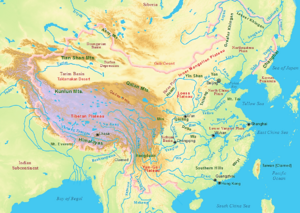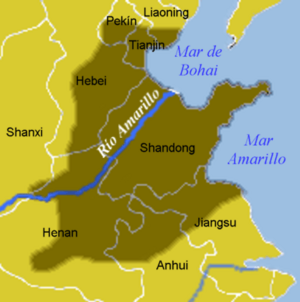North China Plain facts for kids
The North China Plain (also called Huáběi Píngyuán in Chinese) is a huge, flat area in China. It was formed over millions of years by the Yellow River dropping lots of silt and soil. This makes it the largest flat area made of river deposits in China.
The plain has mountains on its sides: the Yanshan Mountains to the north, the Taihang Mountains to the west, and the Dabie Mountains and Tianmu Mountains to the south. To the east, it meets the Yellow Sea. The Yellow River flows right through the middle of the plain and empties into the Bohai Sea.
This large plain covers much of Henan, Hebei, and Shandong provinces. It also connects with the Yangtze River Delta in northern Jiangsu and Anhui provinces. The Yellow River winds its way across this rich farmland, which is home to many people.
What is the North China Plain?
The North China Plain is a very important farming area in China. Farmers here grow crops like corn, sorghum, winter wheat, vegetables, and cotton. Because of its rich soil, it is sometimes called "Land of the yellow earth."
The southern part of the plain is known as the Central Plain. This area is very special because it is where Chinese civilization first began.
Size and importance
This flat plain covers about 409,500 square kilometers (about 158,000 square miles). Most of it is less than 50 meters (about 164 feet) above sea level. This makes it a very flat area.
Besides the crops mentioned, millet, wheat, sesame seed, and peanuts are also grown here. The North China Plain is one of the most crowded places on Earth, with many people living and working there.
Major cities and industry
Beijing, the capital city of China, is located on the northeast edge of the plain. Tianjin, which is an important industrial city and a busy port, is close to the northeast coast.
The Shengli Oil Field in Shandong province is a key place for getting oil. The Yellow River, which is central to the plain, also flows through this region.
See also
 In Spanish: Llanura del Norte de China para niños
In Spanish: Llanura del Norte de China para niños
 | Emma Amos |
 | Edward Mitchell Bannister |
 | Larry D. Alexander |
 | Ernie Barnes |



